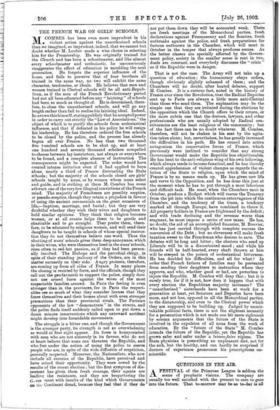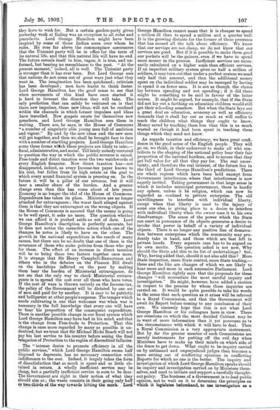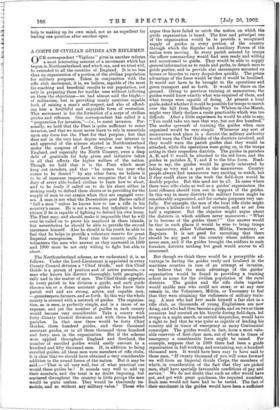QUESTIONS IN THE AIR.
AFEST/VAL of the Primrose League is seldom the scene of prophetic visions. The company are usually too well satisfied with the present to care to gaze into the future. That to-morrow may be as to-day is all they have to wish for. But a certain garden-party given yesterday week at Ealing was an exception to all rules and precedents. Lord George Hamilton might have been inspired by some of those Indian seers over whom he rules. He rose far above the commonplace assurances that the Unionist party will be in office for the term of its natural life, and that this natural life will have no end. The future reveals itself to him, vague, it is true, and un- formed, but bearing no resemblance to the past. " At the present moment," indeed, all is well. The Unionist party as stronger than it ha.s ever been. But Lord George sees that nations do not come out of great wars just what they went in. The imagination has been quickened ; criticism las been developed ; men have learnt to think faster. Lord George Hamilton has the good sense to see that when movements of this kind have once started it is hard to forecast the direction they will take. The only prediction that can safely be ventured on is that these new impulses, these new ideas, will not be confined within the channels in which former impulses and ideas lave travelled. New gospels create for themselves new 'preachers, and Lord George Hamilton sees them in waiting. There are, he says, in the House of Commons "a. number of singularly able young men full of ambition and vigour." By and by the new ideas and the new men will get together, and then we shall be brought face to face with a number of startling projects. Lord George Hamilton notes three forms witch these projects are likely to take,— fiscal, administrative, and social. Till lately nobody ventured to question the way in which the public revenue is raised. Free-trade and direct taxation were the two watchwords of every English financier. Now direct taxation has—not disappeared, indeed, as every Income-tax payer knows to his cost, but fallen from its high estate as the goal to which every sound financial system is pressing on. In the future it will be a pillar of our revenue, but it will bear a smaller share of the burden. And a greater change even than this has, come about of late years. Economy is no longer the idol of the House of Commons. Expenditure has taken its place. Ministers are no longer attacked for extravagance ; the worst fault alleged against them is that they are extravagant on the wrong objects. If the House of Commons is assured that the money is going to be well spent, it asks no more. The question whether we can afford it is pushed aside as out of date. Lord George Hamilton's description is perfectly accurate, but he does not notice the corrective action which one of the changes he notes, is likely to have on the other. The growth in the, national expenditure is the result of many causes, but there can be no doubt that one of them is the severance of those who make policies from those who pay for them. The effect of an increase in direct taxation will be to bring these two factors together once more. It is strange that Sir Henry Campbell-Bannerman and others who in the debates on the Finance Bill dwelt en the hardships inflicted on the poor by making theta bear the burden of Ministerial extravagance, do not see that the only way to check Ministerial extrava- gance is to spread the cost over all those who have votes. If the cost of wars is thrown entirely on the Income-tax, the policy of the Government will be dictated by one set of men and paid for by another. It is easy to be patriotip and belligerent at other people's expense. The temper which needs cultivating is one that welcomes war when war is necessary in the full knowledge that every one will have to bear his proportion of the consequent expenditure. There is another possible change in our fiscal system which Lord George Hamilton may have had in his mind, and that is the change from Free-trade to Protection. That this change is once more regarded by many as possible is un- doubted, but we trust that Sir Michael Hicks Beach will not pay his lest service to his country before seeing the final relegation of Protection to the region of discredited fallacies.
The " intense desire to promote efficiency in all the public services," which Lord. George Hamilton seems half disposed to deprecate, has no necessary connection with indifference to the cost. Indeed, it largely takes the form of dissatisfaction that so much is spent and so little ob- tained in return. A wholly inefficient service may be Cheap, but a partially inefficient service is sure to be dear. The Government are right in their notion of what they should aim at ; the waste consists in their going only half or two-thirds of the way towards hitting the mark. Lord George Hamilton cannot mean that it is cheaper to spend a million ill than to spend a million and a quarter well. It is the growing distaste for the former of these processes that has caused all the talk about efficiency. We know that our services are not cheap, we do not know that our services are good. But if it is possible to make them good our pockets will be the gainers, even if we have to spend more money in the process. Inefficient services are neces- sarily calculated on a higher scale than efficient services. If an imperfect military system gives us half a million of soldiers, it may turn out that under a perfect system we need only half that amount, and then the additional money spent on the individual soldier may be recouped by having to spend it on fewer men. It is not as though the choice lay between spending and not spending ; if it did there might be something to be said in favour of the latter course. It might be argued, for example, that if the State did not lay out a farthing on education children would still get their schooling somehow. But when the State lays out a great deal on education, economy as well as efficiency demands that it shall lay out as much as will suffice to teach the children what things they ought to know. Money saved by teaching them less than this is as much wasted as though it had been spent in teaching them things which they need not know.
As regards taxation and efficiency, we have great confi- dence in the good sense of the English people. They will go on, we think, in their endeavour to make all who con- tribute to the shaping of the national policy bear their fair proportion of the national burdens, and to secure that they get full value for all that they pay for. The real uncer- tainty, and therefore the real interest, of the future lies in the third of Lord George Hamilton's predictions. There are whole regions which have been held exempt from Government interference, where that interference is now eagerly invited. Taking government in that large sense in which it includes municipal government, there is hardly any sphere, unless it be religion, which can now be regarded as confined to private enterprise. The old unwillingness to interfere with individual liberty, except when that liberty is used to the injury of some one else, is giving place to a desire to interfere with individual liberty when the owner uses it to his own disadvantage. The sense of the power which the State can exert in pursuance of its objects generates a desire to invoke that power in behalf of a variety of individual objects. There is no longer any positive line of demarca- tion between enterprises which the community may pru- dently take in hand, and those which are best left in private hands. Every separate case has to be argued on its own merits. The question asked is not now, Why should the State add this to its list of undertakings ? but, Why, having added that, should it not also add this ? More State inspection, more State control, more State trading,— these and the like are changes of which we are likely to hear more and more in each successive Parliament. Lord George Hamilton rightly says that the proposals for these changes " will necessitate the most careful inquiry and investigation." He might, however, have added a caution in respect to the persons by whom these inquiries are carried on. It would be quite possible to take his words in the sense that each question as it arises will be referred to a Royal Commission, and that the Government will await its Report before coming to any conclusion of their own. We sincerely hope that this is not what Lord George Hamilton or his colleagues have in view. There are occasions on which the most decided Cabinet may be in want of more information than it yet possesses as to the circumstances with which it will have to deal. Then a Royal Commission is a very appropriate instrument. But by far the greater number of such Commissions are merely instruments for putting off the evil day when Ministers have to make up their minds on which side of the fence to get down. What ought to be inquiry carried on by unbiassed and unprejudiced judges then becomes a mere setting out of conflicting opinions in conflicting Reports for which no one is the better. The inquiry and investigation of which Lord. George Hamilton speaks should be inquiry and investigation carried on by Ministers them- selves, and used to initiate and support a carefully thought: out policy. The business of a Government is to lead public • opunon, not to wait on it to determine the principles on which it legislates beforehand, to use investigation as a help to making up its own mind, not as an expedient for leaving one question after another open.








































 Previous page
Previous page